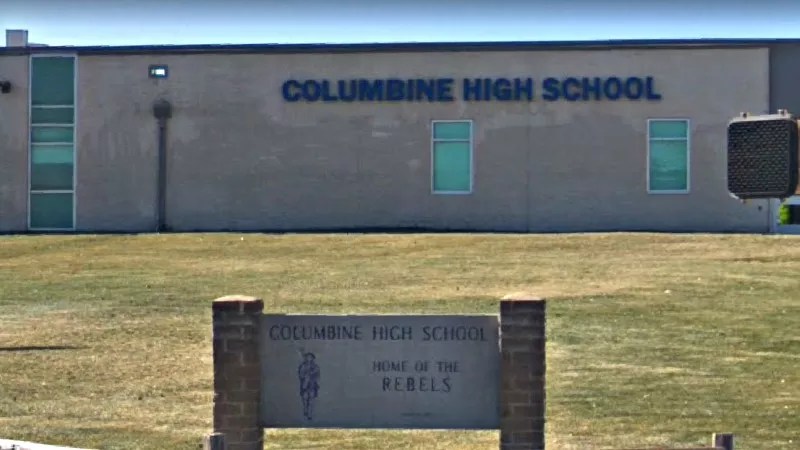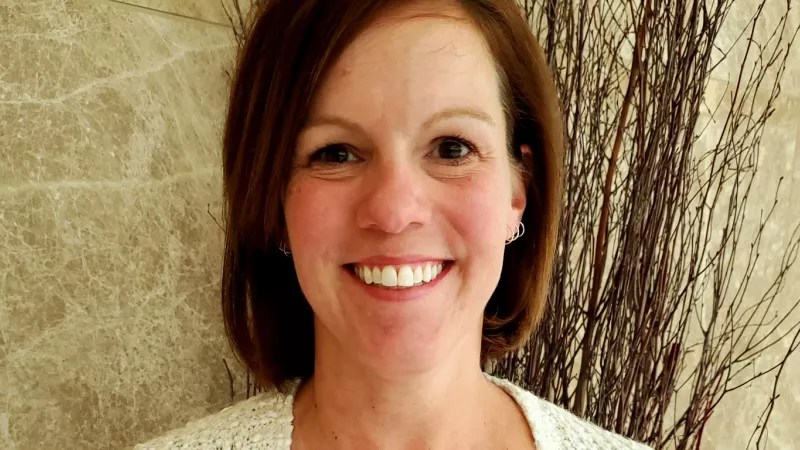
Google Maps

Audio By Carbonatix
Saturday, April 20, marks twenty years since the attack on Columbine High School, during which two twelfth-graders killed a dozen fellow students and a teacher before taking their own lives.
Following this tragedy, veteran law enforcement agent and child safety advocate Susan Payne founded Safe2Tell, a Colorado organization that’s become a national model for preventing school-related cataclysms of all sorts, from shootings to suicides, by encouraging students to anonymously reveal what they know. But as we approach what Payne refers to as the latest Columbine “date of remembrance” (she dislikes using the word “anniversary,” which she associates with celebrations, not sad occasions), Safe2Tell is in transition.
Payne, who’s among the speakers at “Uniting to Prevent School Violence,” an event that gets under way at 8 a.m. today, April 16, on the University of Colorado Anschutz Medical Campus (see details below), has handed over leadership of Safe2Tell to new director Essi Ellis, who sings her predecessor’s praises; in Ellis’s words, “Susan Payne was truly a visionary for our state.” But Payne says that she will continue to serve as a resource for Safe2Tell even as she works to bring the concept to more places around the country in a variety of new roles, including a position as a school safety and prevention expert with the University of Colorado’s Center for the Study and Prevention of Violence.
In the meantime, Payne is keeping a close watch on events leading up to April 20. Even though the date falls on a Saturday, when schools won’t be in session, she says that students, parents, teachers and authorities need to be even more vigilant than usual.
“We’re going to have to monitor data this week and be prepared for additional threats to come through – and they may not be here in Colorado,” Payne says. “With the national media that’s happening, schools all around the country have to be mindful of this week and this month. We need to really be comprehensive in our strategies. That’s one reason why all these efforts are so important.”
After becoming a member of the Colorado Springs Police Department nearly three decades ago, Payne placed much of her focus on kids, serving as a school resource officer, among other positions. Then, in 1997, two years before Columbine, she started a prevention-oriented pilot program in the Pikes Peak region – the precursor to Safe2Tell.

Susan Payne is now a staffer with CU’s Center for the Study and Prevention of Violence.
After the Columbine killings, Colorado established a safe-school hotline, but it wasn’t used very often; Payne estimates that fewer than seven reports were filed over a two-year period. So in 2003, the framework for Safe2Tell was put in place under the auspices of Crime Stoppers, with Payne serving as director and the Colorado Trust providing a seed-money grant. The program was incorporated as a nonprofit in 2006, with Payne becoming its executive director. Three years later, she added the title of First Special Agent with the Colorado Department of Public Safety-Homeland Security, and by 2014, Safe2Tell had transitioned from a public-private partnership to an operation under the Colorado Attorney General’s Office.
Safe2Tell’s technology has evolved over time, too. There remains a web option for reporting, but the method that’s employed most often is the mobile app, whose ease of use has resulted in a steadily growing number of tips, with even greater flare-ups after major tragedies. According to Payne, more than 2,000 messages came through in the two weeks after last year’s bloodshed in Parkland, Florida – roughly double what was a typical rate for that time. Yet she stresses that every dispatch is investigated by appropriate school and law enforcement personnel utilizing an increasingly sophisticated communication network.
Along the way, Payne became the go-to person nationally to assist officials beyond Colorado to develop Safe2Tell-like agencies of their own. “I’ve helped seven states now,” she says. “They’re not called Safe2Tell, because there’s never been an agreement with the legislature to let them use the name. But I helped with OK2Say in Michigan and Safe Voice in Nevada, which has the same software platform as Colorado’s.”
The proliferation of such agencies has convinced Payne that the Safe2Tell concept needs to go nationwide, and she’s been spreading her message through speeches around the U.S. But this past October, she reveals, “the decision was made that I wouldn’t be able to do that anymore. It was a directive that came down that was never explained, but I had to accept it, because it came from my chain of command.” After wrestling with the edict, she decided to honor previously scheduled speaking engagements, including a keynote address at a Department of Homeland Security roundtable in Washington, D.C., and a talk at the National School Safety Conference in Maryland, traveling on her own time. And thanks to the position with CU’s Center for the Study and Prevention of Violence, she’ll have a greater opportunity to do so while also working with nonprofits such as Safe and Sound Schools, started after the 2012 massacre in Newtown, Connecticut, and the U.S. Secret Service’s National Threat Assessment Center.
Her departure opened up the door for Ellis, who has spent the past eleven years as the director of emergency management and preparedness for two University of Colorado institutions, CU Denver and the Anschutz Medical Campus. She points out that “we did a lot of work on preparedness for the campus community, including early intervention and safety. That’s where I find the value in this whole process.”
Ellis is looking forward to “building and maintaining and, really, enhancing the collaborative partnerships we have with schools, law enforcement and community members, and looking at how we can build Safe2Tell into an even more robust program.”

Essi Ellis is the new director of Safe2Tell.
Colorado Attorney General’s office
Under Colorado Attorney General Phil Weiser, Safe2Tell has received a new burst of funding that’s allowed for the hiring of a second data analyst for the core team, as well as another training professional. “That gives us the opportunity to really reach the far corners of the state of Colorado and work more intensively with school districts and law enforcement to make sure they have an understanding of the proper uses of Safe2Tell,” says Ellis. “The additional training, I think, is going to be a huge boon for us.”
These hires are needed given the service’s steep growth curve. In 2017, Ellis says, about 9,100 tips were recorded. Last year, that number came in at around 16,000, representing what has become a fairly typical 70 percent annual increase that she chalks up to “a cultural shift. We’re really trying to empower our youth to feel comfortable reporting incidents and breaking the code of silence. That provides us with information to hopefully help us get to early intervention and prevention. We take that as a cultural benefit for all of us.”
That’s certainly true when it comes to life-saving information about those considering suicide. “I never realized that concerns about suicides would be the leading thing that would be reported through Safe2Tell,” Payne admits. “It’s giving young people a chance to speak up if someone needs help. They may say, ‘I can’t go in and tell an adult, because of the betrayal of my friend or sibling.’ But there are times when they do need an adult’s help, and over 2,800 times last year, there were interventions with suicidal youth or young people exhibiting signs that they were struggling or hurting. To me, it’s about presenting hope and health, which needs to be part of a comprehensive school safety initiative.”
She adds: “We need to build this across the country. I felt compelled to help do that at the national level. But I’m not done helping in Colorado, either.”
“Uniting to Prevent School Violence” takes place from 8 a.m. to 4 p.m. today in the Education 2 South Auditorium on the CU Anschutz Medical Campus. Registration is $15 for students and $25 for the general public, and lunch is included. In addition to Payne, speakers include Attorney General Weiser and retired Columbine principal Frank DeAngelis, with welcoming remarks from Governor Jared Polis. Click for more details.